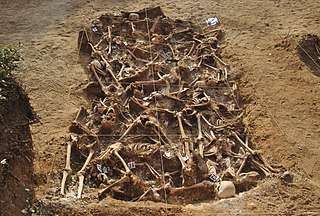
A mass grave is a grave containing multiple human corpses, which may or may not be identified prior to burial. The United Nations has defined a criminal mass grave as a burial site containing three or more victims of execution, although an exact definition is not unanimously agreed upon. Mass graves are usually created after many people die or are killed, and there is a desire to bury the corpses quickly for sanitation concerns. Although mass graves can be used during major conflicts such as war and crime, in modern times they may be used after a famine, epidemic, or natural disaster. In disasters, mass graves are used for infection and disease control. In such cases, there is often a breakdown of the social infrastructure that would enable proper identification and disposal of individual bodies.
The Nasser Hospital was one of the largest hospitals in the Gaza Strip, Palestine.
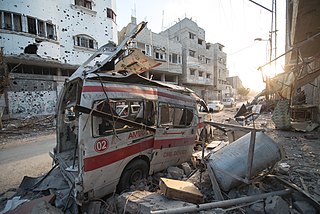
Israeli war crimes are the violations of international criminal law, including war crimes, crimes against humanity and the crime of genocide, which the Israel Defense Forces, the military branch of the state of Israel, has been accused of committing since the founding of Israel in 1948. These have included murder, intentional targeting of civilians, killing prisoners of war and surrendered combatants, indiscriminate attacks, collective punishment, starvation, the use of human shields, sexual violence and rape, torture, pillage, forced transfer, breach of medical neutrality, targeting journalists, attacking civilian and protected objects, wanton destruction, incitement to genocide, and genocide.
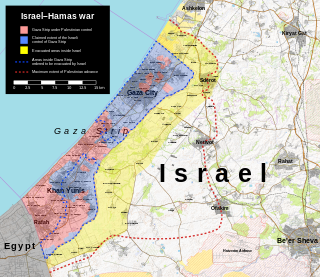
On 27 October 2023, Israel launched an invasion of the Gaza Strip with the stated goals to destroy Hamas, a military and political movement that led an attack on Israel earlier in the month, and to free hostages it took. The effort is ongoing. Before the invasion, dubbed Operation Swords of Iron, Israel declared war, tightened its blockade, and ordered the evacuation of the northern Gaza Strip.
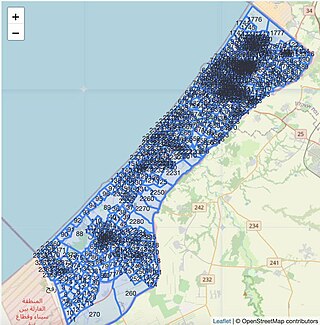
During the Israel–Hamas war, the Israeli military ordered most residents of Gaza to evacuate their homes, displacing hundreds of thousands of people and contributing to a broader humanitarian crisis in the territory. It is the largest displacement of Palestinians in 75 years. Palestinians have described the evacuation as the "second Nakba."

Since the start of the Israel–Hamas war on 7 October 2023, the UN Human Rights Council has identified "clear evidence" of war crimes by both Hamas and the Israel Defense Forces. A UN Commission to the Israel–Palestine conflict stated that there is "clear evidence that war crimes may have been committed in the latest explosion of violence in Israel and Gaza, and all those who have violated international law and targeted civilians must be held accountable." On 27 October, a spokesperson for the OHCHR called for an independent court to review potential war crimes committed by both sides.

Since the outbreak of the Israel–Hamas war on October 7, 2023, Israel has carried out mass arrests and detentions of Palestinians. Thousands have been arrested in the Israeli-occupied Palestinian territories and in Israel, based on alleged militant activity, offensive social media postings, or arbitrarily.
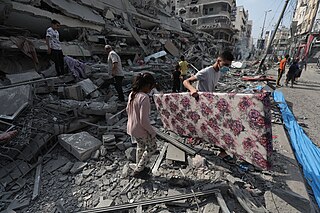
The Gaza Strip is experiencing a humanitarian crisis as a result of the Israel–Hamas war. The crisis includes both a famine and a healthcare collapse. At the start of the war, Israel tightened its blockade on the Gaza Strip, which has resulted in significant shortages of fuel, food, medication, water, and essential medical supplies. This siege resulted in a 90% drop in electricity availability, impacting hospital power supplies, sewage plants, and shutting down the desalination plants that provide drinking water. Widespread disease outbreaks have spread across Gaza.

Al-Shifa Hospital, the largest medical complex in Gaza, was placed under siege by Israel in mid-November 2023 during the Israel–Hamas war, after saying it had contained a Hamas command and control center beneath it. The incident was followed by a second major raid by Israeli forces in March 2024.

A significant number of attacks on healthcare facilities occurred during the Israel-Hamas war. During the first week of the war, there were 94 attacks on health care facilities in Israel and Gaza, killing 29 health care workers and injuring 24. The attacks on healthcare facilities contributed to a severe humanitarian crisis in Gaza. By 30 November, the World Health Organization documented 427 attacks on healthcare in the West Bank and Gaza Strip, resulting in 566 fatalities and 758 injuries. By February 2024, it was reported that "every hospital in Gaza is either damaged, destroyed, or out of service due to lack of fuel." By April, WHO had verified 906 attacks on healthcare in Gaza, the West Bank, Israel, and Lebanon.
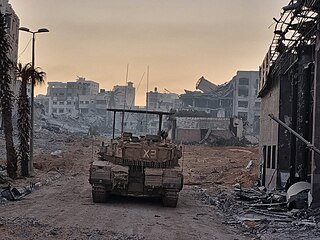
The battle of Khan Yunis, which evolved into the siege of Khan Yunis in late January, began on 1 December 2023 in the midst of the Israeli invasion of the Gaza Strip.

During the Israel–Hamas war, the healthcare system of Gaza was destroyed by Israeli attacks on hospitals and health facilities, killing of healthcare workers, and blockade of medical supplies from entering Gaza. The resulting collapse of the healthcare system was part of a broader humanitarian crisis in the Gaza Strip caused by the war.
More than 685 health workers have been killed and 900 wounded during attacks on medical facilities and medical transport in the Israel-Hamas War. Although the injuries happened both on the Israeli side and on the Palestinian side, most of these attacks were carried out by Israeli forces against Palestinians.
The following is a list of events during the Israeli–Palestinian conflict in 2024.
Israeli forces damaged or destroyed at least 16 cemeteries in the Gaza Strip during the 2023 Israel–Hamas war in various places in Gaza within Palestine, as determined by evidence gathered by CNN, the New York Times and Euro-Med Human Rights Monitor.

Hind Rajab was a six-year-old Palestinian girl from the Tel al-Hawa neighbourhood in Gaza City who was killed by the Israeli military, after being the sole survivor of Israeli tank fire on the vehicle in which she had fled with six relatives.
During the Israel–Hamas war, the Nasser Hospital faced multiple attacks, including a siege and raid in January and February 2024. The hospital siege by Israeli forces created severe shortages of food, anesthesia, and painkillers. Reports emerged of Israeli snipers targeting individuals outside the hospital. Despite international calls for restraint, the Israel Defense Forces (IDF) ordered the evacuation of displaced people inside the hospital on 13 February 2024. On 15 February, Israeli soldiers raided the hospital. The hospital had completely ceased functioning by March 2024.
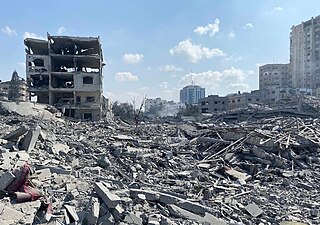
The bombing of the Gaza Strip is an ongoing aerial bombardment campaign on the Gaza Strip by the Israeli Air Force during the Israel–Hamas war. During the bombing, Israeli airstrikes damaged Palestinian refugee camps, schools, hospitals, mosques, churches, and civilian infrastructure.
During the Israel–Hamas war mass graves have been widely used in the Gaza Strip by Palestinians, with the courtyards of many hospitals converted.













